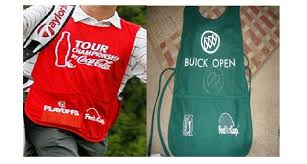PGA Can Use Caddies as “Human Billboards”
By Jennifer E. RothmanFebruary 12, 2016

Earlier this week, a federal district court dismissed a right of publicity claim by golf caddies against the PGA. The caddies objected to being forced to wear bibs that advertise various tournaments, golfers, and third-party corporations. The complaint was filed in September 2015 as part of a move to obtain better treatment of caddies on the pro tour. The court observed with evident sympathy the abysmal treatment of the caddies, noting that one ESPN commentator likened their treatment to that of dogs, and “outside dogs” at that. The court pointed to a tournament last year in which spectators and players were ordered inside due to high winds and a thunderstorm, but the caddies were left to fend for themselves in a metal shed or their own cars.
Deciding they couldn’t take it any longer, 168 caddies filed suit against the PGA in a class action. The class action, however, does not focus on such sleights as being left outside in a thunderstorm. Instead, it focuses on the allegation that the PGA “constricts [the caddies'] endorsement potential and usurps [their] endorsement opportunities.” The PGA requires the caddies to wear sponsored bibs. Caddies who refuse to wear such bibs allegedly have been threatened with termination.

The caddies sought compensation for wearing these bibs. The complaint alleged that the PGA and local tournament hosts receive $50 million per year as compensation for logo placement on these bibs. Apparently, caddies can wear caps that have company logos on them, and if they choose to do so they are compensated. The caddies argued that they should similarly be compensated for wearing the bibs.
The complaint included a Sherman Act claim, contract claim, unfair competition claim, Lanham Act claim, and a right of publicity claim. The right of publicity claim alleged that the caddies’ “likenesses and images” were used for “commercial purposes” without consent or compensation.
The district court dismissed all of the claims with prejudice. The court pointed to the fact that the caddies “have been required to wear the bibs for decades. So caddies know, when they enter the profession, that wearing a bib during tournaments is part of the job.” The court dismissed the right of publicity claim on the basis that the caddies had consented to wearing the bibs both by signing their employment contracts and by knowingly wearing the bibs. They therefore consented to being “human billboards.”
Given the level of knowledge here and the contract terms, the court appropriately decided that there was consent. However, with the recent success by NFL and NCAA players against videogame makers, you can't blame the caddies for trying. They appear to be yet another sympathetic and sometimes mistreated group seeking compensation when their employers or universities get rich off their backs without sharing any of the wealth. The right of publicity, however, is not the appropriate vehicle to right this wrong.
Order Granting Motion to Dismiss, Hicks v. PGA, No. 15-CV-00489-VC (N.D. Cal. Feb. 9, 2016)
Second Amended Complaint, Hicks v. PGA, No. 15-CV-00489-VC (N.D. Cal. Sept. 2015)
